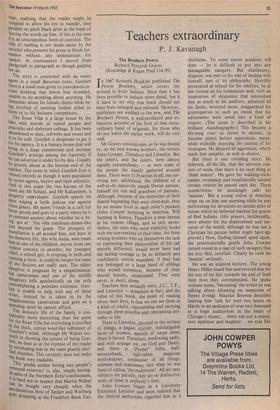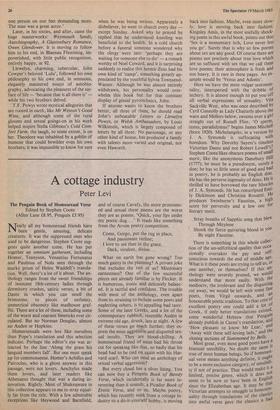Teachers extraordinary
P. J. Kavanagh
The Brothers Powys
Richard Perceval Graves
(Routledge & Kegan Paul £14.95)
-En 1967 Kenneth Hopkins published The 'Powys Brothers, which covers the ground in lively fashion. Since then it has been possible to include more detail, but it is hard to see why that book should not have been enlarged and reissued. However, publishers are wedded to the new, and The Brothers Powys, a well-produced and ex- haustive account of the lives of that extra- ordinary band of originals, for those who do not know the earlier work, will do very well.
Mr Graves concentrates, as he was bound to, on the best known brothers, the writers John Cowper, Theodore and Llewelyn. But the others, and the sisters, were almost equally extraordinary — as were some of the people the family gathered around them. There were 11 Powyses in all, ten sur- viving into adulthood, the children of a well-to-do massively simple Dorset parson, himself the son and grandson of parsons. Although, because of the intensities of their shared beginning they were close-knit, they by no means lived in each other's pockets (John Cowper lecturing in America, Will farming in Kenya, Theodore a near-hermit in his remote village, and so on); never- theless, the ones who most explicitly broke with the conventions of their time, the three writing brothers who set themselves the task of expressing their
Philosophies of life (all entirely different),
would never have had the lasting courage to be so defiantly and confidently contra tnundum, if they had not belonged to a large band of siblings who would somehow, because of their shared history, understand. They were never, in short, alone.
Teachers they certainly were, J.C., T.F., and Llewelyn — preachers in fact; and the value of this book, the point of reading about their lives, is that we can see them as a kind of trinity, representing and carrying through three possible and contrasting atti- tudes to life.
There is Llewelyn, devoted to the surface of things, a pagan enjoyer, indefatigable lover of women, apostle of carpe diem; there is hermit Theodore, meditating sadly, and with strange wit, on God and Death; and there is
mountebank, 'Prester' John, half
i - magician mythologiser, syntlhaelfsiwsehriteof all things, animate and inanimate, into what he was fond of calling 'the multiverse'. All are easy subjects for parody,
they are so distinctive; none of them is anybody's fool. John Cowper began as a University Extension Lecturer and soon realised that the Oxford authorities regarded him as a
charlatan. To some extent academe still does — he is difficult to put into any manageable category. But charlatanry, disguise, was part of his way of dealing with himself, part of his philosophy. Horribly persecuted at school for his oddities, he at last turned on his tormentors and, with an inspiration of eloquence that astonished him as much as his auditors, admitted all his faults, invented more, exaggerated his grotesqueries to such an extent that his adversaries were awed into a kind of respect. (The scene is described in his brilliant Autobiography.) This became a life-long ruse: to clown in earnest, to become abject before opposition, mean- while wickedly enjoying the success of his strategem. He abjured all aggression, which made him amiable, as well as elusive.
But there is one revealing story. He believed, all his life, that the universe con- sists of souls, that there is no such thing as `dead matter'. He gave his walking-sticks names, reverently and ritualistically saluted certain objects he passed each day. These eccentricities he mockingly calls his `manias'. But a young visitor in America crept up on him one morning while he was performing his devotions to certain piles of stones which he believed marked the graves of Red Indians. (His prayers, incidentally, were always for the dispossessed and tor- tured of the world; although he was not a Christian his parson father might have ap- proved.) Now, finding himself spied upon, the preternaturally gentle John Cowper turned round in a rage of such savagery that the boy fled, terrified. Clearly he took his `manias' seriously.
He was an inspired lecturer. The young Henry Miller heard him and revered him for the rest of his life; towards the end of both their lives they corresponded. He spoke without notes, 'becoming' the writer he was talking about (drawing on memories of Henry Irving). Maurice Browne describes hearing him 'talk for over two hours on Hardy to an audience of over two thousand in a huge auditorium in the heart of Chicago's slums; . ..there was not a sound, save applause and laughter... we rose like one person on our feet demanding more. The man was a great actor.'
Later, in his sixties, and after, came the huge masterworks: Weymouth Sands, Autobiography, A Glastonbury Romance, Owen Glendower. It is moving to follow him to his end, in Blaenau Ffestiniog, im- poverished, with little public recognition, entirely happy, at 92.
Llewelyn, charming, tubercular, John Cowper's beloved 'Lulu', followed his own philosophy to his own end, in sensuous, elegantly mannered essays of autobio- graphy, advocating the pleasures of the sur- face of life — 'because that is all there is' while his two brothers delved.
T.F. Powys wrote mystical allegories that are rooted in earth, like Mr Weston's Good Wine, and although some of the rural glooms and sexual goings-on in his work helped inspire Stella Gibbons's Cold Com- fort Farm, the laugh, to some extent, is on her. Theodore was inhabited by a goblin of humour that could bewilder even his own brothers; it was impossible to know for sure
when he was being serious. Apparently a disbeliever, he went to church every day except Sunday. Asked why he prayed he replied that he understood kneeling was beneficial to the health. In a cold church before a funeral someone wondered why the clergy were late: 'perhaps they are waiting for someone else to die' — a remark worthy of Noel Coward, and it is surprising suddenly to realise this hermit-Zeus had his own kind of 'camp', something greatly ap- preciated by the youthful Sylvia Townsend- Warner. Although he was almost entirely withdrawn, his personality would over- whelm this book but for that constant display of genial pyrotechnics, John.
If anyone wants to know the brothers better, all three of them, he should read John's unbeatable Letters to Llewelyn Powys, or Welsh Ambassadors, by Louis Wilkinson, which is largely composed of letters by all three. No parsonage, or any other kind of house, has produced a family with talents more varied and original, not even Haworth.











































 Previous page
Previous page